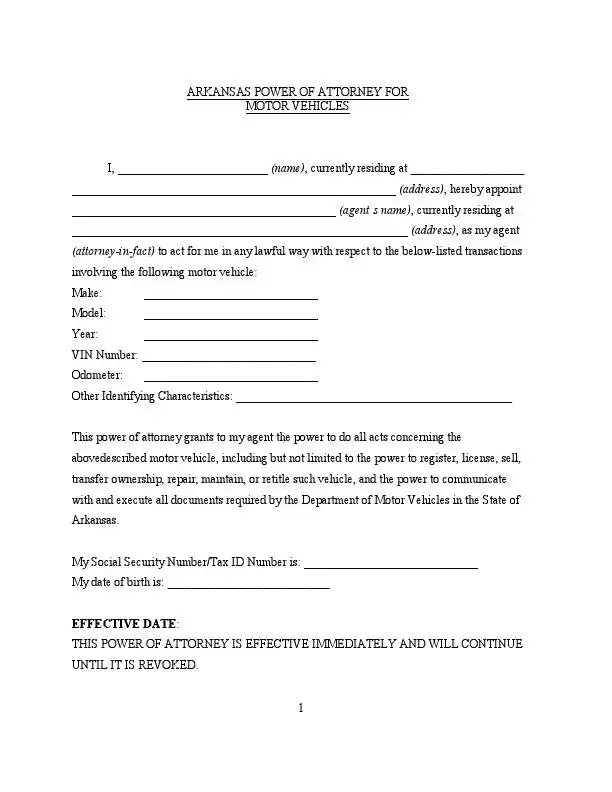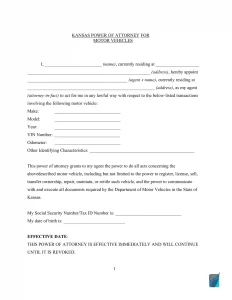Kansas Motor Vehicle Power of Attorney Form
The Kansas motor vehicle power of attorney allows you to grant another person the authority to handle matters related to a vehicle’s title and registration. This form is essential for vehicle owners who cannot personally attend to the transfer procedures due to various reasons, such as travel, health issues, or other personal commitments.

Build Your Document
Answer a few simple questions to make your document in minutes
Save and Print
Save progress and finish on any device, download and print anytime
Sign and Use
Your valid, lawyer-approved document is ready
Here are some key elements that are required in the power of attorney:
- Identity verification. The POA must identify the principal (vehicle owner) and the agent (the person given authority).
- Vehicle information. It should specify the vehicle’s details, including make, model, year, and VIN.
- Scope of authority. The document must outline the specific powers granted to the agent. These powers are generally limited to signing documents required to transfer the vehicle’s title and registration.
The Kansas Department of Revenue provides a standard TR-41 form, simplifying the process. This form ensures compliance with all state requirements and is widely accepted across agencies and entities involved in vehicle transactions. Additionally, like any power of attorney in Kansas, it can be revoked by the principal at any time, provided that the revocation is communicated to the agent and any involved third parties.
Kansas Motor Vehicle Power of Attorney Form Details
| Document Name | Kansas Motor Vehicle Power of Attorney Form |
| State Form Name | Form TR-41 |
| Relevant Link | Kansas Department of Revenue – Division of Vehicles |
| Avg. Time to Fill Out | 8 minutes |
| # of Fillable Fields | 10 |
| Available Formats | Adobe PDF |
Filling Out Kansas Vehicle POA
The Kansas motor vehicle power of attorney (Form TR-41) allows a vehicle owner to authorize another person to handle tasks related to transferring the vehicle’s title and registration. This form is essential to ensure the designated agent can legally perform these actions.
1. Appointing the Attorney-in-Fact
Begin by clearly printing the name of the person you appoint as your attorney-in-fact. This individual will be able to handle the title and registration tasks on your behalf.
2. Vehicle Information
You will need to include the following:
- Year of the vehicle.
- Make of the vehicle.
- Style (body type) of the vehicle.
- Vehicle Identification Number (VIN).
Provide detailed information about the vehicle you are granting power of attorney.
3. Lienholder Information
Indicate whether the vehicle has any liens. If there are no liens, write “None.” If there are liens, provide the names of the 1st and 2nd lienholders. This part ensures that any existing claims on the vehicle are acknowledged during the transfer process.
4. Owner Information and Signature
Write your name as the vehicle owner. Below your printed name, provide your signature. This signature affirms that the information provided is true and correct. It also acknowledges your understanding of the penalties for making false statements under oath.
5. Date the Document
Enter the date when you sign the document. This helps verify the validity of the document and ensures it is current.
6. Federal and State Law Compliance
The form includes a statement about compliance with federal and state laws regarding mileage disclosure and using a secured power of attorney for certain transactions. Be aware that you cannot sign for the buyer and seller in the same transaction unless a secured power of attorney is used, especially for vehicles with specific exemptions based on age and type.
